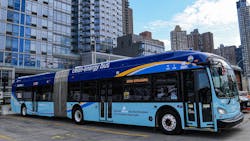MTA deploys first all-electric articulated bus fleet to 14th Street busway
The New York City Transit (NYCT) has deployed the first of its new all-electric articulate bus fleet on the 14th Street busway as part of the agency’s plan to enhance and modernize the bus fleet with zero-emissions technology, which will deliver environmental benefits for all New Yorkers.
“We are committed to a state-of-the-art bus fleet across the entire city that is green and sustainable, and that means moving toward all-electric technology,” said NYCT President Andy Byford. “Our Fast Forward plan provides a blueprint on how we can work with vendors and other stakeholders to achieve that goal in all five boroughs. We’re also thrilled about the popularity of the M14 and the busway that’s helping to enable its success.”
The all-electric articulated bus represents the first of approximately 500 electric buses that will be purchased as part of the 2020-2024 Capital Plan and will serve all five boroughs. NYCT also released new data showing the growing popularity and success of the M14 Select Bus Service (SBS) and the 14th Street busway.
“Our first all-electric articulated fleet represents the future of MTA bus service and I’m excited for our customers to see and experience the difference,” said Craig Cipriano, acting president of MTA Bus Company and senior vice president of NYCT’s Department of Buses. “This is a historic day for MTA buses and the start of our journey to a zero-emissions fleet that will set the standard for the rest of the nation as its largest public bus system.”
The new electric articulated buses represent the next generation of MTA buses as the first to be delivered of the MTA’s own electric fleet, just months after its blue-and-white RTS buses were retired from service after nearly 40 years as a workhorse of the industry. The MTA currently operates a fleet of 10 electric standard buses, which are leased for a three-year pilot program to test the all-electric technology for capability and durability of around-the-clock four-season usage. In January 2019, the MTA Board approved the purchase of 15 all-electric articulated buses, 16 in-depot chargers and one mobile charging unit from New Flyer of America, Inc. The delivery of the first wave of the 15 buses is scheduled for completion in March 2020 with an incentive for earlier delivery. These 15 buses will be deployed on the crosstown M14 route SBS, which serves more than 30,000 weekday customers and provides a crucial transit link and alternate L Project service to thousands of customers.
The 2020-2024 Capital Plan accelerates the transition to a fleet composed fully of zero-emissions electric buses. The MTA plans to invest $1.1 billion to modify depots for electric bus operations, and to purchase 500 electric buses, including replacement buses and some additional buses. The program enables the MTA to acquire only electric buses beginning in 2029. Future all-electric buses will be deployed in neighborhoods across the five boroughs after depots are upgraded to accommodate the new technology.
NYCT also released new data showing that customers are increasingly choosing the M14 SBS even during hours when L service is running at peak frequency, in an example of a bus line serving as a comparably fast and convenient alternative to a parallel subway line. These ridership increases are sustained despite seasonal fluctuations.
A chart comparing 2018 and 2019 ridership by peak periods on the M14 is below:
The Metropolitan Transportation Authority says it removes 17 million metric tons of carbon emissions from the air per year by providing public transit services as an alternative to personal vehicle use, and an all-electric bus fleet would further reduce New Yorkers’ carbon footprint. All-electric propulsion technology also results in quieter operations in addition to the benefits of zero tail-pipe emissions, which make it ideal for operating vehicles in densely populated areas such as New York City. All-electric buses use an electric motor powered by a battery pack, and its propulsion systems recapture energy normally wasted in braking. Articulated buses, which are higher-capacity 60-foot buses used on SBS as well as on higher ridership routes, are ideal for electrification when used in densely populated urban areas where carbon emissions and traffic noise are public concerns.
NYCT’s Fast Forward plan to modernize the subway and bus networks builds upon its existing efforts to improve environmental sustainability and resiliency by proposing to add more electric buses to the fleet across the entire city. NYCT recently issued a Request for Proposals for a base order of 45 standard electric buses that will be put into service in all five boroughs upon delivery beginning April 2021 through the end of 2021.
Other bus service initiatives to improve service and speed up rides include redesigning every borough’s bus route network, implementing automated bus lane enforcement on fleet vehicles and streets, working with the New York City Department of Transportation to prioritize transit and collaborating with NYPD to enforce bus lanes.
